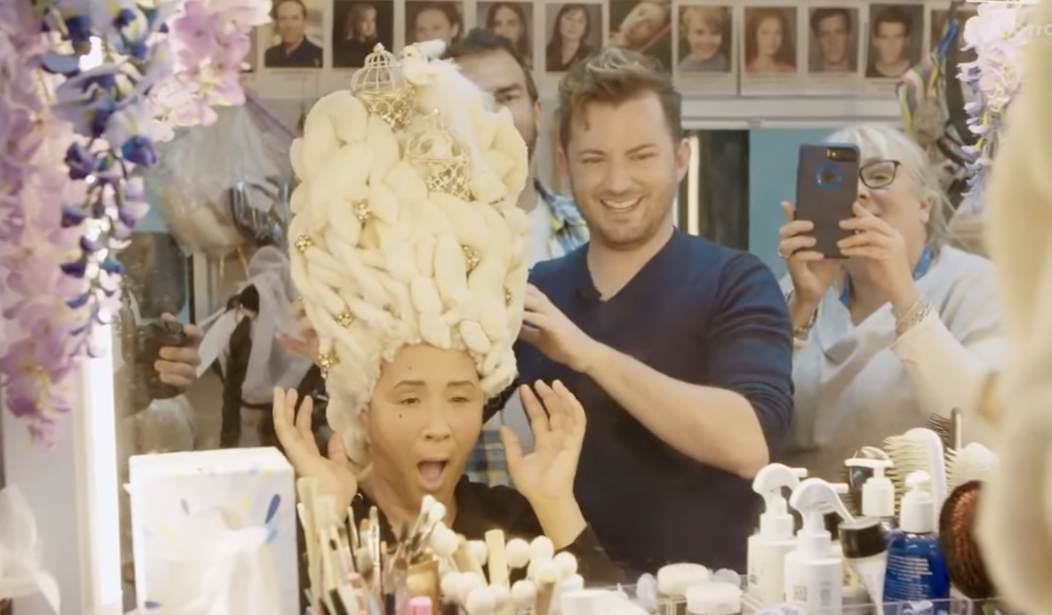Some of you think everything Netflix does is too woke for consumption. I will admit that a lot of it is a waste of time. But Shonda Rhimes’ recent “Bridgerton” spinoff “Queen Charlotte” doesn’t deserve the vitriol it’s getting from conservative corners. Many times, those of us on the right have a knee-jerk negative reaction to race-swapping well-known characters whether fictional or real. This is understandable most of the time because the intention behind it seems nefarious.
For instance, the recent hullabaloo over Jada Pinkett Smith race-swapping Cleopatra, the Greek Queen of Egypt, with a black woman had serious political overtones. For whatever reason, there is a conspiracy theory that persists in black America that purports that Cleopatra was actually black. If it were a possibility, not debunked by historical record, it wouldn’t be that big of a deal to speculate.
But reality does matter, and with the revisionist history in front of our eyes — from the rewriting of COVID-19 lockdown history to the changing narrative on masks — people are sick of gaslighting. And so the race of Cleopatra matters to people who are sick of being lied to. Arab News wrote about the plethora of evidence that Cleopatra was of Greek descent. No one who is a serious scholar of history disputes it.
Cleopatra was not black. As well documented history attests, she was the descendant of a Macedonian Greek general who was a contemporary of Alexander the Great. Her first language was Greek and in contemporary busts and portraits she is depicted clearly as being white.
The evidence for Cleopatra’s true heritage is overwhelming – and not, as Pinkett Smith has said in defense of the show, “highly debated.”
The actress playing Cleopatra has offered this advice to the show’s many critics: “If you don’t like the casting, don’t watch the show.” It is advice that I, and I suspect countless Egyptians, intend to take.
And so with “Cleopatra” in the news and getting roundly mocked for Pinkett Smith’s silly conspiracies about the Egyptian queen, it didn’t surprise me to see people rolling their eyes at Rhimes’s new spin-off of “Bridgerton,” “Queen Charlotte,” about England’s first black queen. But these two things are not the same. “Bridgerton” is set in an alternate reality in a place we recognize and a time and fashion we recognize but with an entirely different fictional historical set of circumstances.
“Bridgerton” does not pretend to be a historic retelling of Mad King George and his queen Charlotte of Mecklenburg, who is quite clearly a white German woman according to all paintings and records. Instead, the setting of “Bridgerton” and the spin-off “Queen Charlotte” merely borrows historical figures but imagines them in a totally different timeline where people of Moorish blood have been somewhat included in polite society but still sidelined until King George marries one of their own.
Watching #queencharlotte on @netflix Best @bridgerton yet!!! I wish there were more episodes pic.twitter.com/DO0FFFomQU
— Greg Silva (@gregsilva1) August 9, 2023
It is not intended to tell a true story but the opposite. It is a fantasy, a what-if, and a trip down a road not taken. Rhimes is an incredibly gifted storyteller whose understanding of love and romance is something rarely seen in modern entertainment. As racy as Rhimes gets (and her stuff is always very heavy on soft-core porn, including gay scenes I could do without), she always is able to tap into the sweetest stories of love, loss, struggle, frustration, and the things that move the human spirit to acts of greatness or betrayal.
The first “Bridgerton” stories spanned two seasons focusing on matchmaking young women with handsome and powerful dukes. They were fun, but nothing has been as good as the spin-off “Queen Charlotte.” In this new series, the audience is treated to the backstory of how King George (Just George, Farmer George) met his queen in this alternate universe and the struggles he had hiding his mental illness from her. “Mad” King George is portrayed in a way that evokes empathy and makes one wonder how difficult it must have been so long ago to have suffered from a common mental illness that no one understood.
Not only was it shameful and something to hide, but the remedies were truly barbaric. This is not a tale of trying to rewrite history. It is a story that weaves real history, a mentally ill king of England suffering all the indignities of that age of ignorance while finding someone who chose to love him anyway. It wasn’t necessary for Rhimes to write Charlotte’s character as historically accurate.
There’s probably little about any of “Bridgerton” that is historically accurate — like kings and queens falling in love in the first place. Everyone knows that royal marriages were mostly arranged for convenience and power. Much reality must be suspended to believe any of it. And the show makes no attempt to convince you it is real. In fact, it is over-the-top unbelievable, which is what makes it fun.
But the thing that Rhimes does so well is to write a story that pulls you in. You root for these characters and their happiness. You want them to succeed, to overcome, to find their path. It’s a rare thing when it seems most showrunners are trying to outdo each other in creating the most unlikeable characters in history. (See the “Sex and the City” spinoff “And Just Like That” for proof.)
“Queen Charlotte” is a heart-tugging tale that every person on earth can relate to. There is wisdom in it — a thing so rare in Hollywood — wisdom that we here in conservative media continue to try and impart to the masses: love is not a feeling. It is a choice. It is choosing every day to love the person you committed your life to. Love does not run. Love does not give up. Love endures.
This is the overwhelming message in Rhimes’ show that should be celebrated and amplified in this cynical and selfish culture where divorce is the norm and no one really means “in sickness and in health.” Charlotte means it. Charlotte lives it. Though she didn’t know this would be her lot and has to come to grips with the disappointment that her life will never be normal while she shields her husband from the world, protects his throne, and helps him live with his illness, she chooses it anyway. It’s beautiful.
"From the moment I saw you trying to go over the wall, I have loved you desperately," he declared. "I cannot breathe when you are not near. I love you, Charlotte. My heart calls your name" #QueenCharlotte 🥹🫶 pic.twitter.com/Iu3Lk4DSJb
— Kari ☘︎ BellyConrad Endgame ❤️🔥 (@SerieKar) July 20, 2023
Yes, there are some naughty scenes. Yes, Rhimes loves to write gay love stories as an underlying side story. But even so, the way she does it doesn’t offend because her characters are always seeking the real thing, not a hook-up for gratuitous reasons. And if you don’t want to watch it, it’s nothing the fast-forward button can’t cure.
The show is worth seeing, and Queen Charlotte of Mecklenburg’s status as a white German woman who became queen is not threatened in any way by having her name used for a fictional character in a clearly alternate universe for fictional purposes.
The other thing I admire about Rhimes’ imagining of the “Bridgerton” universe as a society struggling with race and class is that there are no stereotypical bad white people. Some of them aren’t nice, but most of them are. There isn’t the sense that Rhimes blames whites in general for the tensions or problems in her world or that this show is some kind of scolding woke lesson for us. Instead, all races are muddling through it together, and they find they come out stronger together, not pushing one another away.
This is a good message. Rhimes spends no time “educating” the white characters about the changing society. They simply exist there, and for once, we are allowed to forget about the constant struggle because “Bridgerton” has overcome it.
I get the feeling that Rhimes loves all her characters, and she wants them to succeed as much as we do. What she has imagined in “Bridgerton” is the kind of world we should all want to have. It’s a place where race is ceasing to matter and character is everything. It is the exact type of world that Martin Luther King Jr. imagined for us.
Rhimes also takes a break from the stories of young love to bring us the very real struggles of the widows in the show who have been alone for a long time and still desire to be loved. Something I hear regularly from members of my audience is that, as single older women, it’s a real struggle to find love and feel useful or wanted. The show illustrates this sadness so well. All people want to be loved. There is no age at which that desire disappears. Ruth Gemmel who plays Lady Violet does a great performance of this experience as she confides in her friend Lady Danbury, played by the talented Adjoa Andoh.
Golda Rosheuval, who is an incredible talent, plays the elder Queen Charlotte. Watching her is absolutely delightful. She can be funny with a slight twitch of her face and then in a flash bring the mood to seriousness with her gravitas. She’s awesome. I feel like I would have missed something wonderful by not seeing her in this role.
What “Queen Charlotte” does is go back before the racial tensions in “Bridgerton” ceased and shows us how “The Great Experiment” of integrating society was started in this fictional place and why. I was expecting it to be at least a little insufferable and preachy, but it was nothing of the sort. It’s a lovely story full of characters you come to care about deeply. And instead of solving racial unrest through force, division, and shaming (the way our betters always try to do it), in “Bridgerton,” it is solved through love and unity.
What I haven’t brought up is the incredible fashion and Queen Charlotte’s hair, which is incomparable to anything I’ve ever seen. It must be seen to be believed how high they can get these wigs. The costume department is off-the-charts fun. And if we need anything these days it’s MORE FUN!
Before you criticize Rhimes for her imaginative alternative universe where a black woman can be Queen of England, watch it. You cannot judge a show by its Netflix thumbnail.










Join the conversation as a VIP Member